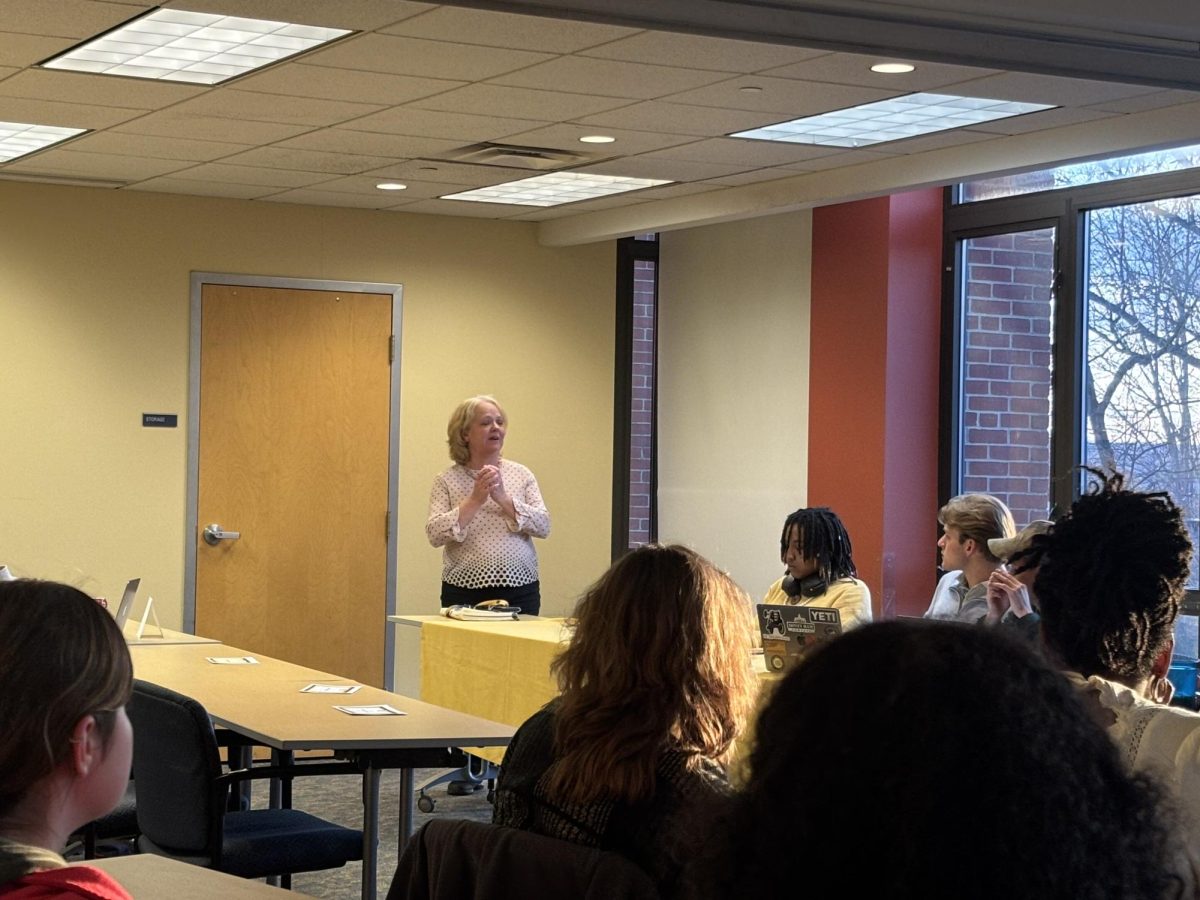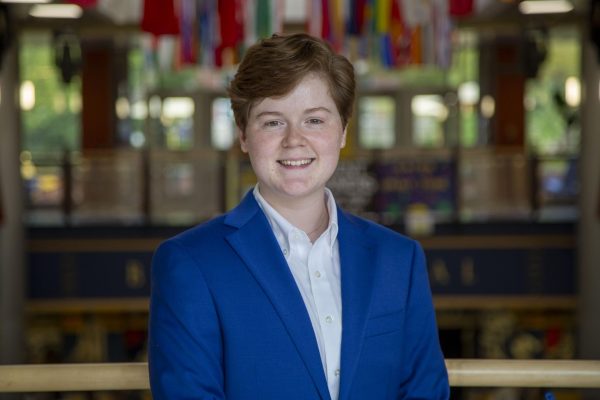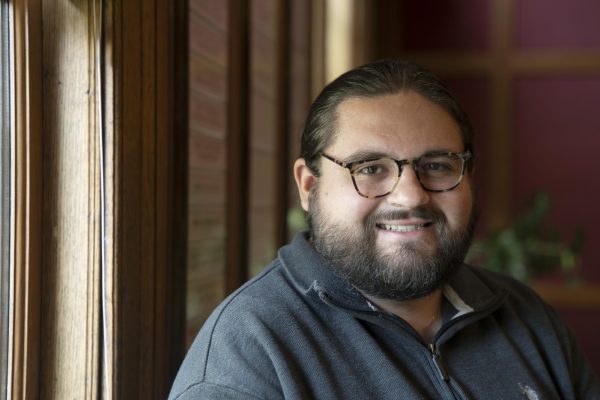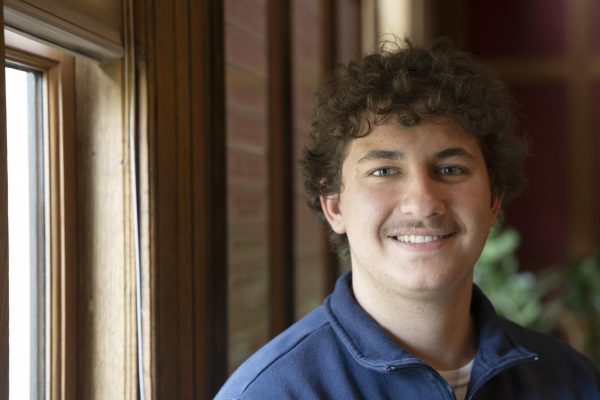A recent talk championing the fight to prevent transgender women from participating in women’s sports was met with repeated applause from a sympathetic audience of just over 40 students and members of the Meadville region on the evening of Thursday, April 10. Organized by the recently established Allegheny College chapter of Turning Point USA, the event saw very little pushback or criticism from the audience which filled approximately half of the seats in the Schultz Banquet Hall, with most attendees appearing to already agree with the speaker’s main points.
The speaker, Olivia Krolczyk, is an ambassador for the Riley Gaines Center who rose to prominence in May 2023 after posting a viral TikTok video in which she alleged that she received a failing grade on a project as a student at the University of Cincinnati for her use of the term “biological woman.” Krolczyk’s talk, titled “The Fight is Far From Over: Defending Free Speech and Women’s Sports,” is part of a nationwide tour focused on her experience as a student and collegiate track athlete and her belief that “woke” ideologies are harming women.
“I’m here because my story goes to show that the issue of men in women’s sports extends far beyond the locker room, far beyond the pool, far beyond the field, far beyond the track,” Krolczyk said during her talk. “It extends into our classrooms and it affects students just like you guys. It affected me as a student.”
In the days leading up to Krolczyk’s visit, tensions ran high on campus as students debated whether the Turning Point USA event violated the college’s Statement of Community. Dozens took to the anonymous social media platform YikYak to voice their concerns, express support for transgender peers, and begin to organize public displays of disapproval. Several alumni even waded into the fray, posting on various social media platforms that they intended to make clear to the college how disappointed they were that their alma mater would allow Krolczyk to speak.
Further adding to the tension was a video co-posted to Instagram by Krolczyk and the Turning Point USA Allegheny College chapter just days before the event. Taken at the entrance of the Henderson Campus Center during a May 5, 2022 abortion rights rally, the video documents an altercation between two students, one of whom records himself yelling an inflammatory statement at the rally. The second student responds by yelling, approaching the recorder and kicking several times in his direction. Text overlaying the video read, “Student attacked for speaking out against Pro-Abortion Rally at Allegheny College.”
The video garnered over 300 comments in the following days. Some defended the rally-goer’s actions, pointing out that the recorder had intentionally disrupted the rally, while others sharply criticized the rally-goer, calling them names like “fascist” and “Nazi.” Also among the commenters were those denouncing the posting of the video, debating the merits of abortion, and making violent statements about the protestors like, “Civil war is coming unfortunately” and “These people should be met with equal or greater violence.”
In her caption, Krolczyk said the video had been sent to her by the student who recorded it as a warning for her event.
“From students at this campus I’m receiving messages telling me to kill myself, that I should be put in a concentration camp, etc.,” Krolczyk wrote.
The day before Krolczyk was scheduled to speak, President Ron Cole, ’87, addressed her appearance in a campus-wide email.
“The speaker was invited by a student organization that has followed all College policies and procedures,” Cole wrote. “This does not equate to the College endorsing the views of the speaker.”
Cole explained that free speech is encouraged and supported at Allegheny, but that there are still standards everyone is equally expected to follow.
“As such we are striving to uphold the tenet of free speech by providing all students the ability to express differing perspectives and ideologies,” Cole wrote, “and we also expect responsibility and accountability in the exercise of these freedoms.”
“I have confidence that our Allegheny community will rise above hateful rhetoric even when the issues are filled with passion,” Cole concluded. “We do this as a campus that prepares students to apply critical thinking and differing perspectives as engaged citizens in our diverse and interconnected world.”
Despite the tensions leading up to Krolczyk’s lecture, the evening of April 10 proceeded without any major clashes between Turning Point USA and those in opposition to the event. As attendees filed into the Schultz Banquet Hall, they were met with a printed sign on the front door reminding readers of the college’s peaceful assembly policy. Then, they were greeted by two people at the door checking identifications and ensuring attendees had pre-reserved their tickets.
Two Public Safety officers monitored from the back of the room. Flyers advertising the event had warned attendees against bringing bags, a policy of the Leadership Institute, the Arlington, Virginia-based nonprofit that funded Krolczyk’s visit and that describes itself as the place “where conservative leaders are made.”
Two college employees charged with ensuring the safety of the event could be heard discussing their plan for managing a potential counterprotest as the event began.
About 100 yards away, on the lawn outside the Newton Observatory, over 100 students and faculty members participated in a “Trans Joy Jamboree,” a gathering to “celebrate trans joy, success, and athleticism,” according to its flyer. The jamboree was scheduled at the same time as Turning Point USA’s event but was not billed as a counter-protest.
All Gender Equity Society Vice President Rion McCluskey, ’26, who helped organize the event, explained that the space was designed to uplift transgender students, not direct attention toward the Turning Point USA event.
“We are not really interested in the idea of a protest for something like this because that’s what she (Krolczyk) wants,” McCluskey said in an interview with The Campus. “We’re not about being negative, we’re not about putting down anyone else’s ideas. We’re about lifting up our trans friends on this campus. This is an event for joy and fun and it’s just something for trans people that’s happening at the same time and same place. It’s not about them, it’s about us.”
Turning Point USA President Ian Hutter, ’26, was pleased with the number of people who showed up to hear Krolczyk speak.
“I think it was a pretty decent turnout, especially with how many female athletes came,” Hutter said. “I thought it was really important they showed up.”
Hutter said he was inspired to invite Krolczyk after a representative of the Leadership Institute came to one of Turning Point USA’s tabling events and offered the group a list of potential speakers. The Leadership Institute is a nonprofit that “turns conservatives into leaders — empowered to defend and advance the founding principles of our country,” according to its website.
Despite his overall satisfaction, Hutter also wished a more diverse selection of students had attended the talk.
“I am a little disappointed with the lack of opposition in the room,” Hutter said. “I would have loved to see people come in and, not protest, but share their own thoughts and actually had discussion. That’s what I’m really hoping for overall with this kind of club on campus, is to promote discussion, because I think that there’s not enough of it on campus right now.”
Krolczyk, who competed as a runner at both the high school and collegiate level, opened her speech by discussing an executive order issued by President Donald Trump in February that bars transgender women from competing in female sports. Effective implementation of the executive order could eliminate the need for her work as an activist for free speech and women’s identity, opportunities and safety, Krolczyk noted.
“I do still have a job,” Krolczyk continued, “because, unfortunately, we have weak leaders across this entire nation, at universities, organizations, clubs, weak individuals, who have said that they will directly defy Donald Trump’s executive order and allow men into women’s sports, even if it means losing their federal funding.”
Just one day after the executive order was issued, the NCAA banned transgender women from competing in women’s sports under its umbrella, which includes more than 530,000 student-athletes. NCAA President Charlie Baker testified before Congress in December that there were “less than 10” transgender athletes in the NCAA.
In an interview with The Campus before the event, Krolczyk explained that her primary concerns involve policies at public universities, rather than private colleges like Allegheny.
“When I’m talking about indoctrination, I specifically have a problem with it at public universities, where taxpayer dollars are funding indoctrination for students,” Krolczyk said.
Private universities, she said, have private donors and more leeway to determine what they teach their students, which applies to both left-leaning and right-leaning institutions.
“I’m a Christian myself,” Krolczyk said, “so I love to see that religious aspect being offered on campuses.”
During the question-and-answer portion of the event, several members of the Allegheny athletic community touched on their feelings about transgender women participating in women’s sports teams.
“It’s something I hear a lot when I pose this issue, is that’s not that many people,” said Chloe Bonson, ’26, a member of the Women’s Cross Country team. “If it happens to one girl, then it is too much.”
Assistant Cross Country and Track & Field Coach Tara Gologram asked Krolczyk what she thinks can be done to clearly identify transgender student-athletes. Gologram told the audience that she had recently reviewed a list of student-athletes who wanted to transfer to Allegheny and only found out that some of them were transgender women after seeing they had previously been listed on the men’s roster.
Krolczyk advised Gologram to stick to the “truth” and protect her female athletes by speaking with the transgender athletes about joining the men’s team instead.
In response to another student’s question, Krolczyk said that she has been called a Trans-Exclusionary Radical Feminist, a form of feminism that excludes transgender women from the fight for women’s rights. Being a TERF is the only “correct” version of feminism, according to Krolczyk.
Before the event, Krolczyk emphasized that her tour is centered around telling her story, not anything “crazy.”
“A lot of people come here and expect to hear me say, like, horrible things, that I’m anti-this or anti-this,” Krolczyk told The Campus. “That’s not what I’m here to do. I’m here to share my story. Hopefully, my story resonates with a student or two. That’s my goal, is to inspire at least one person to speak up or ask for help.”
The Riley Gaines Center, where Krolczyk works as an ambassador, was founded in August 2023 by Riley Gaines, a former competitive swimmer for the University of Kentucky. Gaines attracted national attention for speaking out against Lia Thomas when Thomas became the first openly transgender athlete to win a NCAA Division I national championship. Krolczyk also works as a Campus Reform Reporter. Both positions are projects of the Leadership Institute.
Christy Hornstein, president of the Crawford County Women’s Group, attended the Turning Point USA event.
“I have four daughters and three granddaughters and they all played sports from the time they were kindergarten age up through college,” Hornstein told The Campus. “I never thought that I would see a day where a man would want to participate in women’s sports.”
Hornstein knows Braeden Means, ’28, vice president of the Allegheny Turning Point USA chapter, from their work together on the “Strengthen Meadville” campaign that is attempting to elect Republican candidates Don Erdley for mayor and Bill Lawrence and Jim Roha to City Council. (A few days prior to Krolczyk’s visit, Means announced that a culture of intolerance atAllegheny had driven him to decide to transfer out of the college at the end of the academic year.)
“Being a lifelong healthcare worker, I am aware that mental health issues affect people’s behaviors, people’s thought processes,” Hornstein said. “Olivia’s right, we have to have some empathy for the people that are going through this. But that doesn’t mean that their rights are more important than the rights of the women that are being disenfranchised.”
Denise Pollard, a retired public school teacher who also attended the event, echoed points brought up by Krolczyk and Hornstein.
“I also have a couple family members that have transitioned, so I do have empathy,” Pollard said. “It doesn’t mean that I have to accept it. I love them. I think they were fearfully and wonderfully made by God. I don’t think God makes mistakes. But it doesn’t mean I have to go along with their viewpoint.”
Pollard’s interest in Krolczyk’s appearance was reinforced by her experience as an educator.
“In the public school system it’s becoming somewhat of a contagion,” she said. “I do think that there are mental health issues, I’ve seen it throughout my 32-plus career teaching.”
Vice President for Enrollment Management Jennifer Winge, ’96, described her pride in how the college community handled the event.
“I think our students have done a fantastic job making sure their voices are heard and are respectful of differing perspectives of one another,” Winge said. “That is what Allegheny is here to do, is to support students and their opportunity to express themselves, to learn and be able to represent different points of view.”
Quentin Hoegerl, ’27, one of nine people who posed a question to Krolczyk during her talk, had not heard about the event until receiving the campus-wide email from Cole and only decided to attend after reading it.
He had no familiarity with Krolczyk before the event.
“I thought it was more peaceful than it would be,” Hoegerl said. “I expected to at least see people at the doors, sort of deterring people to come in.”
Hoegerl pointed to freedom of speech as being what makes the U.S. “great.” He said Krolczyk’s visit was refreshing because he worries that too often, people do not speak up or express their true thoughts because they are afraid of the consequences.
Conversation about several of the issues raised by Krolczyk’s visit continued in the days following the event.
On the morning of Friday, April 11, the Sustained Dialogues team invited students to engage in a moderated dialogue and reflection during lunch that same day.
Allegheny Queer People of Color hosted a discussion on transgender women in sports on Monday, April 14 in room 206 of the campus center. Several images on the event flyer express support for transgender women in sports. The QPOC event was announced before Turning Point USA announced its event.
Hoegerl was hopeful that continued conversations on campus would include conservative viewpoints like Krolczyk’s.
“I’m glad it happened — I want more of it,” Hoegerl said. “The other side gets enough, you know, they get enough representation.”













dadsized • Apr 17, 2025 at 4:30 am
Extraordinarily measured writing on an infuriating subject.
These TP dorks have an endless budget generated from the white pride outrage machine to attempt to resegregate education and the nation while claiming victim status over what, coming in sixth place in a track and field competition or something? Keep crying.